中考专区二轮专题-------现在完成时复习课件36张
文档属性
| 名称 | 中考专区二轮专题-------现在完成时复习课件36张 | 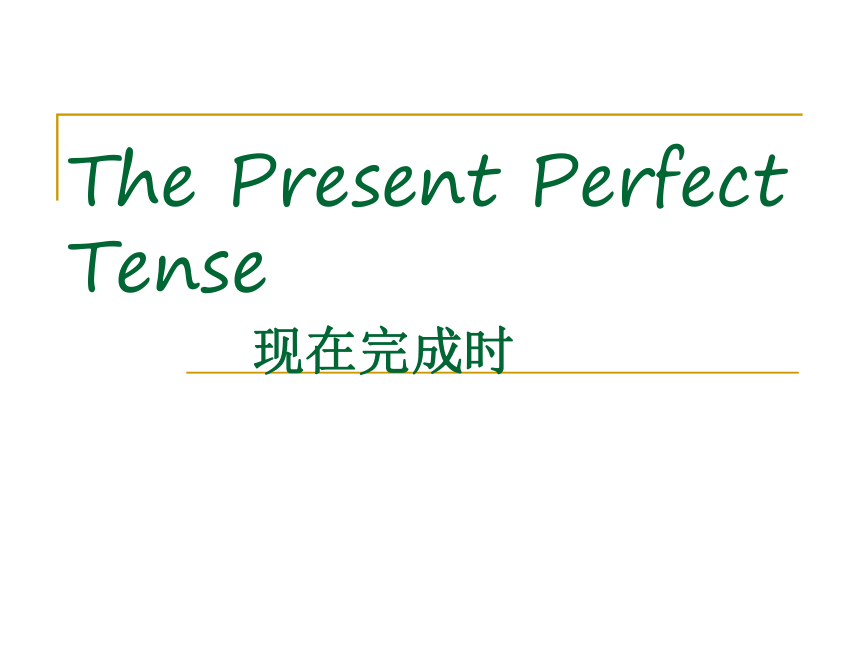 | |
| 格式 | ppt | ||
| 文件大小 | 1.2MB | ||
| 资源类型 | 教案 | ||
| 版本资源 | 通用版 | ||
| 科目 | 英语 | ||
| 更新时间 | 2021-03-18 20:33:00 | ||
图片预览

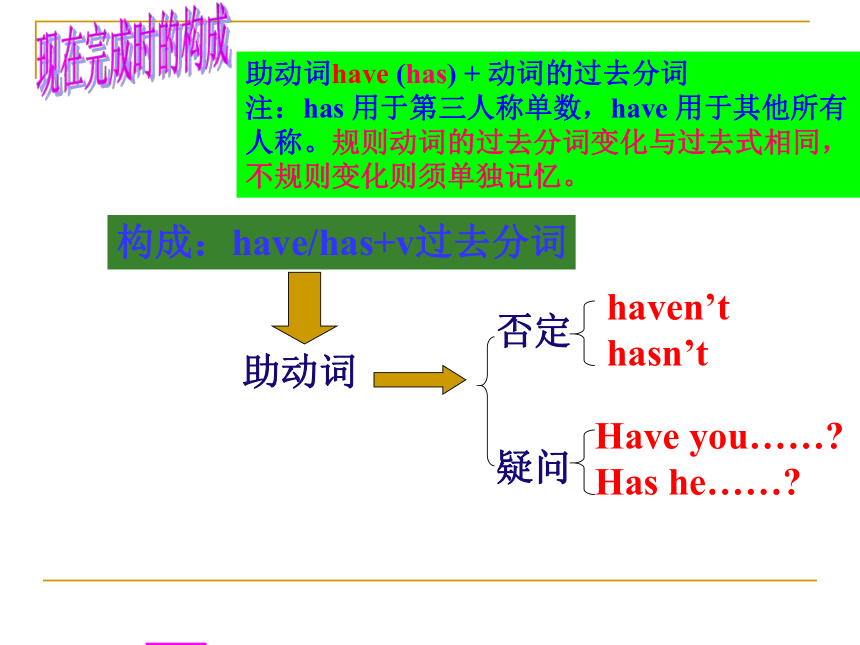
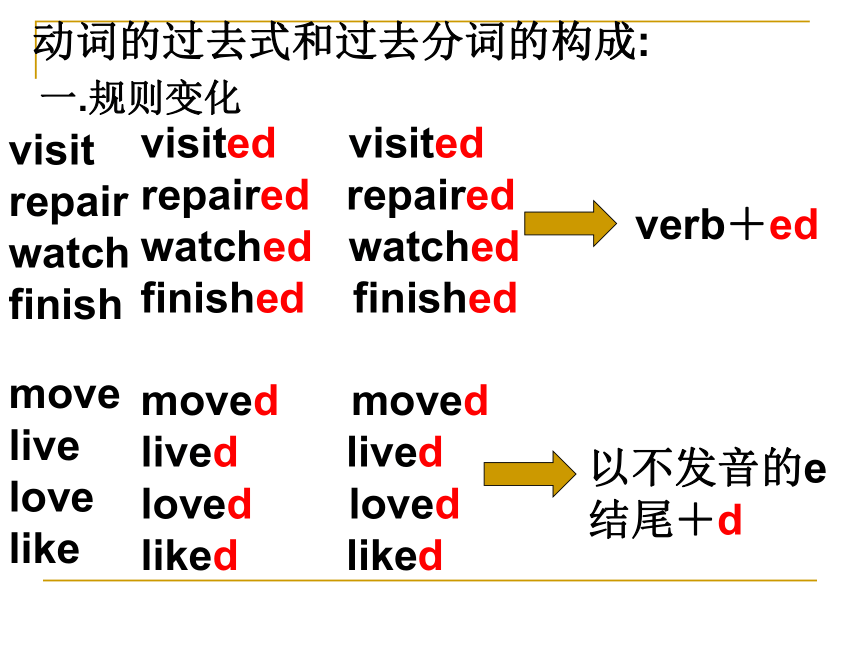
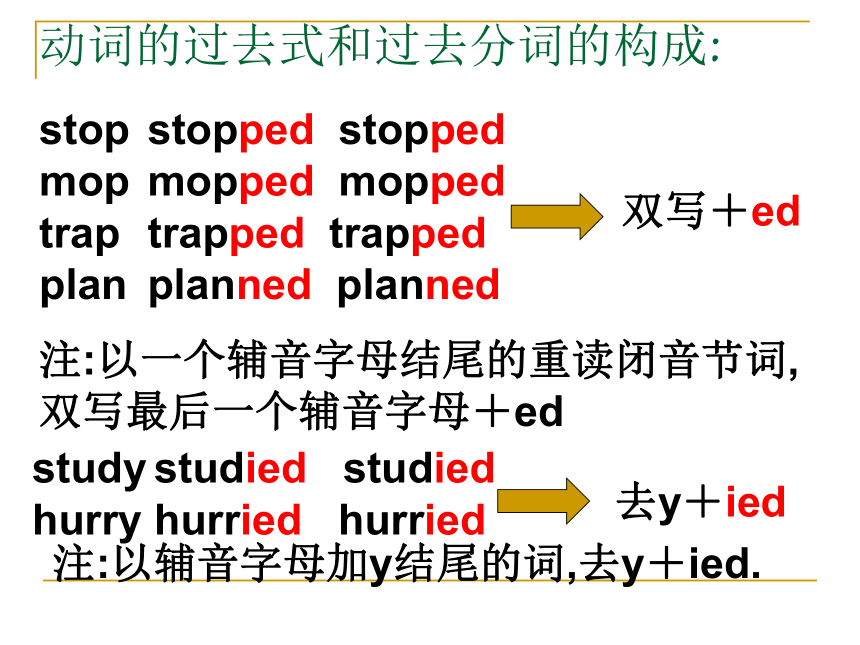
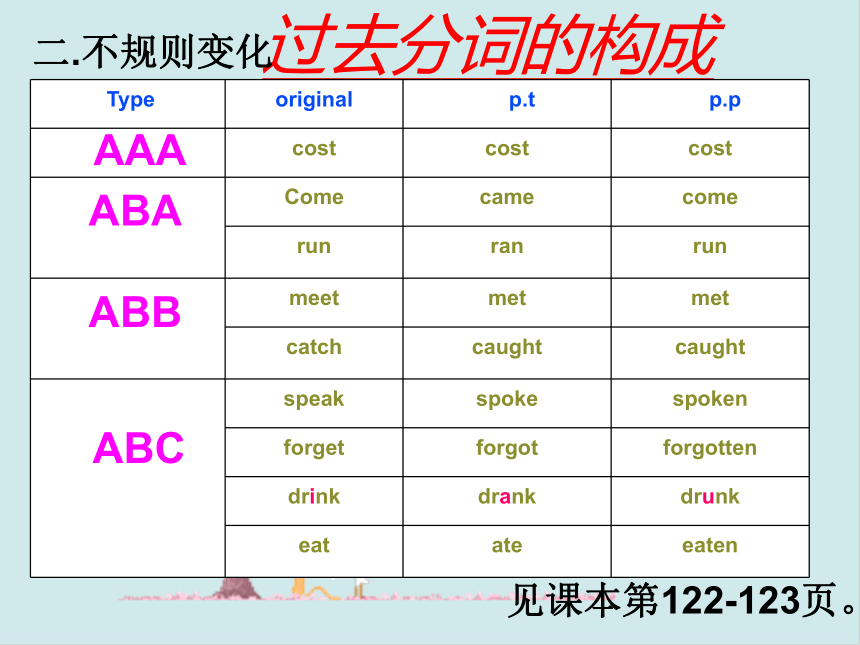
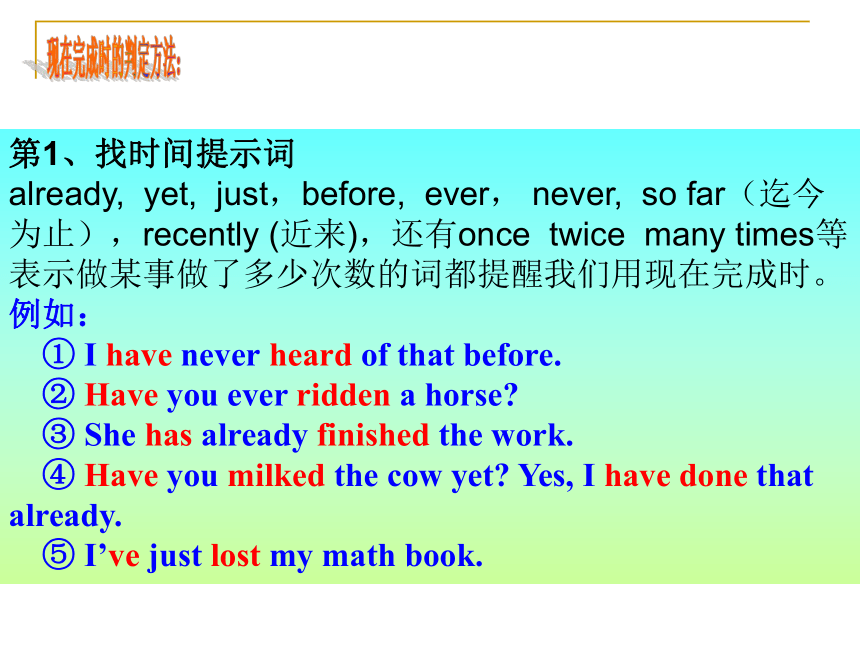
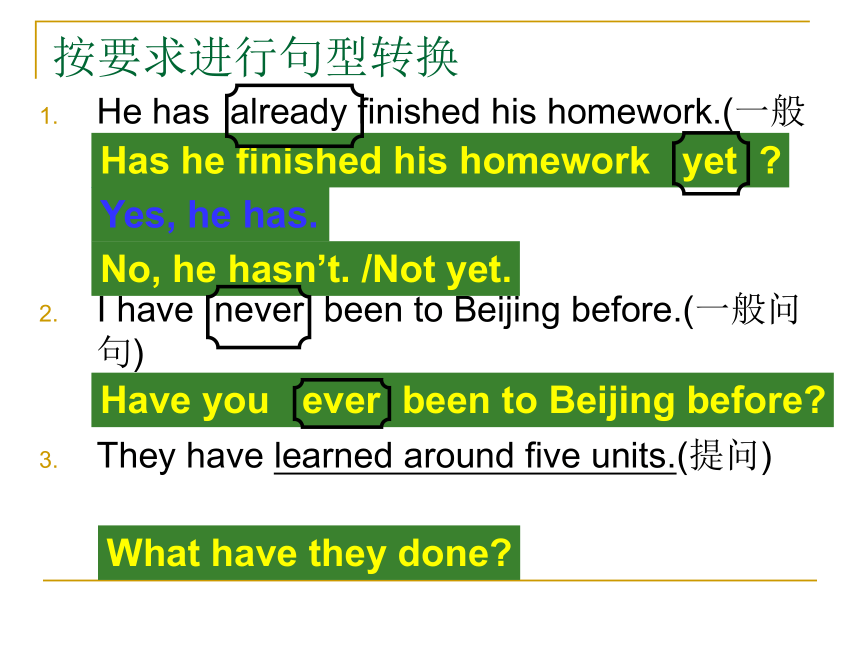

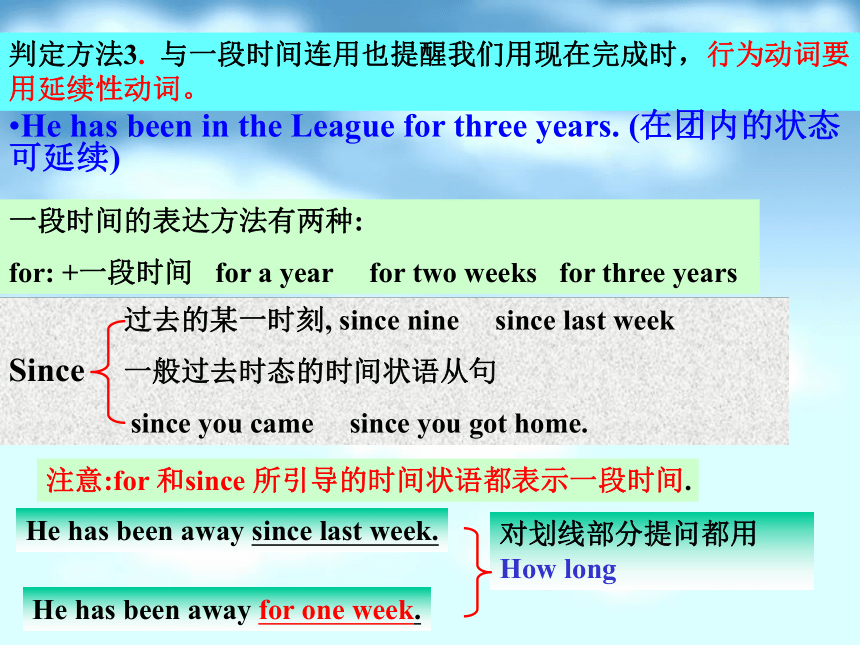
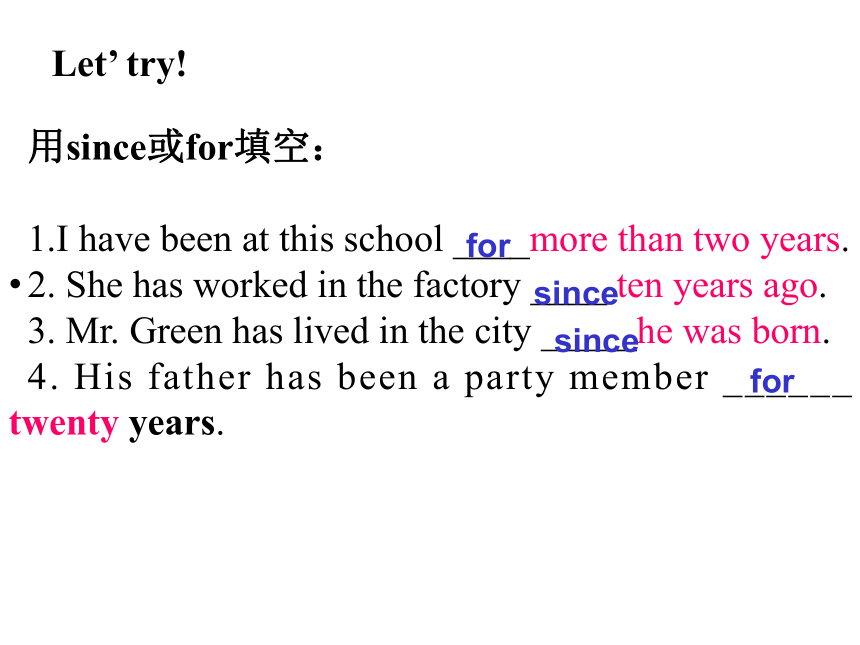
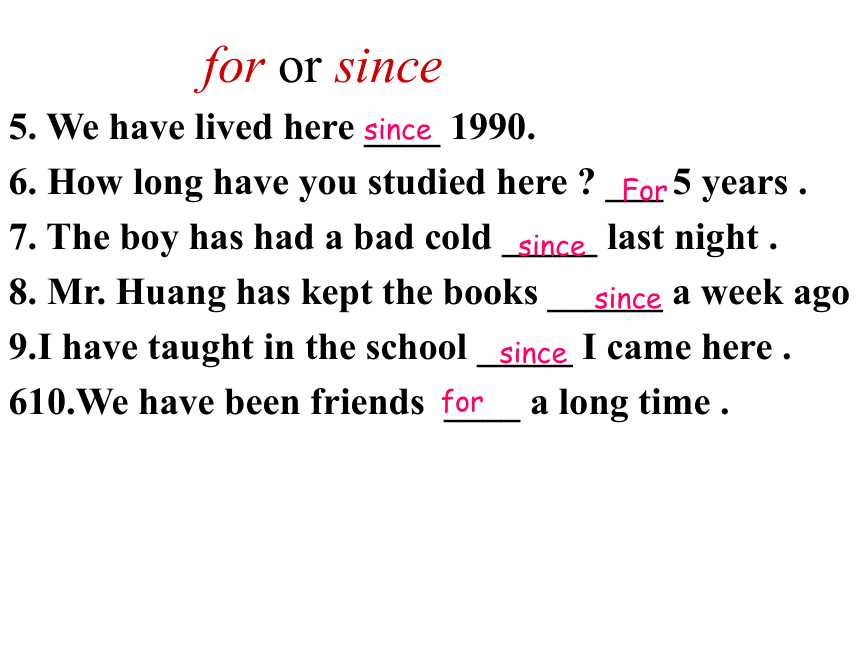
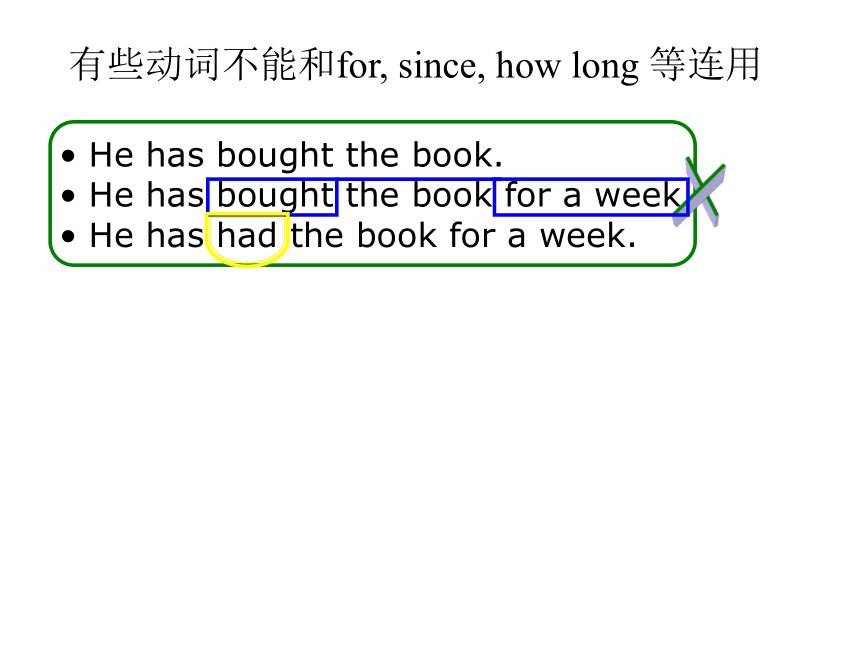
文档简介
(共36张PPT)
The Present Perfect Tense
现在完成时
助动词have (has) + 动词的过去分词
注:has 用于第三人称单数,have 用于其他所有人称。规则动词的过去分词变化与过去式相同,不规则变化则须单独记忆。
构成:have/has+v过去分词
助动词
否定
疑问
haven’t
hasn’t
Have you……
Has he……
move
live
love
like
动词的过去式和过去分词的构成:
visit
repair
watch
finish
visited visited
repaired repaired
watched watched
finished finished
moved moved
lived lived
loved loved
liked liked
verb+ed
以不发音的e
结尾+d
一.规则变化
stop
mop
trap
plan
stopped stopped
mopped mopped
trapped trapped
planned planned
注:以一个辅音字母结尾的重读闭音节词,双写最后一个辅音字母+ed
双写+ed
study
hurry
studied studied
hurried hurried
去y+ied
注:以辅音字母加y结尾的词,去y+ied.
动词的过去式和过去分词的构成:
过去分词的构成
Type original p.t p.p
cost cost cost
Come came come
run ran run
meet met met
catch caught caught
speak spoke spoken
forget forgot forgotten
drink drank drunk
eat ate eaten
ABB
AAA
ABC
ABA
二.不规则变化
见课本第122-123页。
第1、找时间提示词
already, yet, just,before, ever, never, so far(迄今为止),recently (近来),还有once twice many times等表示做某事做了多少次数的词都提醒我们用现在完成时。 例如:
① I have never heard of that before.
② Have you ever ridden a horse
③ She has already finished the work.
④ Have you milked the cow yet Yes, I have done that already.
⑤ I’ve just lost my math book.
按要求进行句型转换
He has already finished his homework.(一般问句,并作肯定、否定回答)
I have never been to Beijing before.(一般问句)
They have learned around five units.(提问)
Has he finished his homework yet
Yes, he has.
No, he hasn’t. /Not yet.
Have you ever been to Beijing before
What have they done
第2、根据定义来判断
如果没有时间提示词,就根据定义判断:如果过去的某个动作对现在造成了影响或结果,那么这个动作的时态就可以用现在完成时来表示。
I _____ (eat) the bread, I’m full now.
Tom _____(see) the film, so he won’t go with us tonight.
Jim _____(know) the news ,so you needn’t tell him again.
判定方法3. 与一段时间连用也提醒我们用现在完成时,行为动词要用延续性动词。
一段时间的表达方法有两种:
for: +一段时间 for a year for two weeks for three years
过去的某一时刻, since nine since last week
一般过去时态的时间状语从句
since you came since you got home.
注意:for 和since 所引导的时间状语都表示一段时间.
He has been away since last week.
He has been away for one week.
对划线部分提问都用How long
Since
He has been in the League for three years. (在团内的状态可延续)
Let’ try!
用since或for填空:
1.I have been at this school ____more than two years.
2. She has worked in the factory ____ ten years ago.
3. Mr. Green has lived in the city _____he was born.
4. His father has been a party member ______ twenty years.
for
for
since
since
for or since
5. We have lived here ____ 1990.
6. How long have you studied here ___ 5 years .
7. The boy has had a bad cold _____ last night .
8. Mr. Huang has kept the books ______ a week ago .
9.I have taught in the school _____ I came here .
610.We have been friends ____ a long time .
since
For
since
since
since
for
He has bought the book.
He has bought the book for a week.
He has had the book for a week.
有些动词不能和for, since, how long 等连用
与一段时间连用,提醒我们用现在完成时,行为动词要用延续性,具体办法是将瞬间动词转化为延续性动词 或者 表状态的be+名词/形容词或副词/介词短语等:
1.直接转化成延续性动词
buy catch (get) a cold
borrow come/go /become
have
have a cold
keep
be
2.转换成be+名词
join the army
join the Party
go to school
be a soldier
be a Party member
be a student
3转换成be+形容词或副词
die finish begin
leave fall sleep
close open
be dead
be over
be on
be away
be asleep
be closed
be open
4.转换成 be+介词短语
go to school
join the army
be in school
be in the army
She has bought the computer for two years.
had
buy
have/has had
How long have you come to the United States?
been in
come to
have/has been in
Ann has gone to China since three months ago.
been in
go to
have/has been in
I have got to Paris for one week .
been in
got to
have/has been in
My brother has joined the army for five years.
been in
been a soldier
join
have/has been in
have/has been a soldier
I have left Shanghai for 3 days.
been away from Shanghai
leave
have/has been away
I have borrowed the dictionary since 3 days ago .
kept
borrow
have/has kept
The film has begun for 10 minutes.
been on
begin
have/has been on
The concert has finished for half an hour.
been over
finish
have/has been over
His dog has died for two years .
been dead
die
have/has been dead
She has married for six years .
been married
marry
have/has been married
判定4、如果笼统地问某人有没有做过某事,常用现在完成时;但是如果接下去问何时何地以何种方式、和某人做的这件事,就用一般过去时。如:
-Have you had your breakfast -Yes, I have.
-When did you have it -At seven thirty.
判定5、have been to、have been in和have gone to的区别:
★have / has been to 表示去过某地又回来了,侧重经历,后面一般加次数
He has been to Beijing three times.
★have / has been in 表示到达某地不回来,就呆在那里了,后面一般加一段时间
He has been in Beijing for 3 years.
★have / has gone (to) 表示某人“已经去某地了”,不知道有没有到,反正不在说话人面前。
A: Is Jim at home now
B: Sorry, he isn’t in. He has gone to Beijing. 他已经去北京了。(人已走,不在这儿)。
– Where is John - He __________ (go) to Tokyo. - When __________ he __________ (go) there - He __________ (go) there last month. He __________ (be) in Tokyo for one month. - When __________ he __________ (come) back - I think he __________ (be) back next month.
现在完成时态延续性用法的几种句型可以转换:
他已经走了三年了 用现在完成时: He has already been away for 3 years / since 3 years ago.
用ago,使用一般过去时。He left three years ago.
用“It is 或(It has been )+一段时间+since +一般过去时从句 ”
It is three years since he left here.
用“ 一段时间+has passed + since + 一般过去时从句”
Three years has passed since he left here.
Miss Gao left an hour ago. (同义句转换)
( )1.You’ve never seen such a wonderful film before, _______
A. haven’t you B. have you C. do you D. don’t you
( ) 2. —I have watched the game.
—When ____ you ____ it
A. have; watched B. do; watch C. did ;watch D. will; watch
( )3. Mr. Green ____ in China since five years ago.
A. lived B. has lived C. lives D. is going to live
( )4. His grandma ______ for two years.
A. died B. has died C. was dead D. has been dead
B
C
B
D
( )5. –Where is Han Mei now
- She ____ to Shanghai. She will be back in two days.
A. has gone B. has been C. goes D. had gone
( )6. -_____ you ____to the United Stated
- No, never,but I went to Canada a few years ago
A. Have; been B. Have; gone C. Did; go D. Do; go
( )7. You haven’t changed your mind,_______
A. do you B. are you C. have you D. did you
( )8. How long have you _____ the football team of
the school
A. played B. been at C. joined D been on
A
A
C
D
( )9. —Where have you _____ these days
—I have _____ to Kunming with my friends.
A been , gone B been , been C gone , been D gone, gone
( )10. How long have you ____ this book
A. bought B. borrowed C. had D. lent
( )11. —Excuse me, ____ you seen the film yet
—Yes, I _____ it last night.
A have, see B have, have seen C have, seen D have, saw
( )12. He has never ridden a horse before,_____
A. is he B. isn’t he C. hasn’t he D. has he
B
C
D
D
exercise
1.I ________ (do) my homework already.
2.He _____________(not finished) his homework yet.
3.____you ever _____(be) to Beijing
4.We ______ never ______ (see) such an exciting match before.
5.Mother _____ just _______(clean) the house. Please don’t come in.
6.They _________________(practice) this dialogue twice.
have done
has not finished
Have
been
have
seen
has
cleaned
have practiced
7.We __________ (learn) English for three years/ since two years ago/since 2009.
8.Mr. Green _________ (be) in China these years.
9.They ____________(write) 15 songs so far.
10.The population ____________ (grow) more slowly in the past ten years.
have learned
has been
have written
has grown
The Present Perfect Tense
现在完成时
助动词have (has) + 动词的过去分词
注:has 用于第三人称单数,have 用于其他所有人称。规则动词的过去分词变化与过去式相同,不规则变化则须单独记忆。
构成:have/has+v过去分词
助动词
否定
疑问
haven’t
hasn’t
Have you……
Has he……
move
live
love
like
动词的过去式和过去分词的构成:
visit
repair
watch
finish
visited visited
repaired repaired
watched watched
finished finished
moved moved
lived lived
loved loved
liked liked
verb+ed
以不发音的e
结尾+d
一.规则变化
stop
mop
trap
plan
stopped stopped
mopped mopped
trapped trapped
planned planned
注:以一个辅音字母结尾的重读闭音节词,双写最后一个辅音字母+ed
双写+ed
study
hurry
studied studied
hurried hurried
去y+ied
注:以辅音字母加y结尾的词,去y+ied.
动词的过去式和过去分词的构成:
过去分词的构成
Type original p.t p.p
cost cost cost
Come came come
run ran run
meet met met
catch caught caught
speak spoke spoken
forget forgot forgotten
drink drank drunk
eat ate eaten
ABB
AAA
ABC
ABA
二.不规则变化
见课本第122-123页。
第1、找时间提示词
already, yet, just,before, ever, never, so far(迄今为止),recently (近来),还有once twice many times等表示做某事做了多少次数的词都提醒我们用现在完成时。 例如:
① I have never heard of that before.
② Have you ever ridden a horse
③ She has already finished the work.
④ Have you milked the cow yet Yes, I have done that already.
⑤ I’ve just lost my math book.
按要求进行句型转换
He has already finished his homework.(一般问句,并作肯定、否定回答)
I have never been to Beijing before.(一般问句)
They have learned around five units.(提问)
Has he finished his homework yet
Yes, he has.
No, he hasn’t. /Not yet.
Have you ever been to Beijing before
What have they done
第2、根据定义来判断
如果没有时间提示词,就根据定义判断:如果过去的某个动作对现在造成了影响或结果,那么这个动作的时态就可以用现在完成时来表示。
I _____ (eat) the bread, I’m full now.
Tom _____(see) the film, so he won’t go with us tonight.
Jim _____(know) the news ,so you needn’t tell him again.
判定方法3. 与一段时间连用也提醒我们用现在完成时,行为动词要用延续性动词。
一段时间的表达方法有两种:
for: +一段时间 for a year for two weeks for three years
过去的某一时刻, since nine since last week
一般过去时态的时间状语从句
since you came since you got home.
注意:for 和since 所引导的时间状语都表示一段时间.
He has been away since last week.
He has been away for one week.
对划线部分提问都用How long
Since
He has been in the League for three years. (在团内的状态可延续)
Let’ try!
用since或for填空:
1.I have been at this school ____more than two years.
2. She has worked in the factory ____ ten years ago.
3. Mr. Green has lived in the city _____he was born.
4. His father has been a party member ______ twenty years.
for
for
since
since
for or since
5. We have lived here ____ 1990.
6. How long have you studied here ___ 5 years .
7. The boy has had a bad cold _____ last night .
8. Mr. Huang has kept the books ______ a week ago .
9.I have taught in the school _____ I came here .
610.We have been friends ____ a long time .
since
For
since
since
since
for
He has bought the book.
He has bought the book for a week.
He has had the book for a week.
有些动词不能和for, since, how long 等连用
与一段时间连用,提醒我们用现在完成时,行为动词要用延续性,具体办法是将瞬间动词转化为延续性动词 或者 表状态的be+名词/形容词或副词/介词短语等:
1.直接转化成延续性动词
buy catch (get) a cold
borrow come/go /become
have
have a cold
keep
be
2.转换成be+名词
join the army
join the Party
go to school
be a soldier
be a Party member
be a student
3转换成be+形容词或副词
die finish begin
leave fall sleep
close open
be dead
be over
be on
be away
be asleep
be closed
be open
4.转换成 be+介词短语
go to school
join the army
be in school
be in the army
She has bought the computer for two years.
had
buy
have/has had
How long have you come to the United States?
been in
come to
have/has been in
Ann has gone to China since three months ago.
been in
go to
have/has been in
I have got to Paris for one week .
been in
got to
have/has been in
My brother has joined the army for five years.
been in
been a soldier
join
have/has been in
have/has been a soldier
I have left Shanghai for 3 days.
been away from Shanghai
leave
have/has been away
I have borrowed the dictionary since 3 days ago .
kept
borrow
have/has kept
The film has begun for 10 minutes.
been on
begin
have/has been on
The concert has finished for half an hour.
been over
finish
have/has been over
His dog has died for two years .
been dead
die
have/has been dead
She has married for six years .
been married
marry
have/has been married
判定4、如果笼统地问某人有没有做过某事,常用现在完成时;但是如果接下去问何时何地以何种方式、和某人做的这件事,就用一般过去时。如:
-Have you had your breakfast -Yes, I have.
-When did you have it -At seven thirty.
判定5、have been to、have been in和have gone to的区别:
★have / has been to 表示去过某地又回来了,侧重经历,后面一般加次数
He has been to Beijing three times.
★have / has been in 表示到达某地不回来,就呆在那里了,后面一般加一段时间
He has been in Beijing for 3 years.
★have / has gone (to) 表示某人“已经去某地了”,不知道有没有到,反正不在说话人面前。
A: Is Jim at home now
B: Sorry, he isn’t in. He has gone to Beijing. 他已经去北京了。(人已走,不在这儿)。
– Where is John - He __________ (go) to Tokyo. - When __________ he __________ (go) there - He __________ (go) there last month. He __________ (be) in Tokyo for one month. - When __________ he __________ (come) back - I think he __________ (be) back next month.
现在完成时态延续性用法的几种句型可以转换:
他已经走了三年了 用现在完成时: He has already been away for 3 years / since 3 years ago.
用ago,使用一般过去时。He left three years ago.
用“It is 或(It has been )+一段时间+since +一般过去时从句 ”
It is three years since he left here.
用“ 一段时间+has passed + since + 一般过去时从句”
Three years has passed since he left here.
Miss Gao left an hour ago. (同义句转换)
( )1.You’ve never seen such a wonderful film before, _______
A. haven’t you B. have you C. do you D. don’t you
( ) 2. —I have watched the game.
—When ____ you ____ it
A. have; watched B. do; watch C. did ;watch D. will; watch
( )3. Mr. Green ____ in China since five years ago.
A. lived B. has lived C. lives D. is going to live
( )4. His grandma ______ for two years.
A. died B. has died C. was dead D. has been dead
B
C
B
D
( )5. –Where is Han Mei now
- She ____ to Shanghai. She will be back in two days.
A. has gone B. has been C. goes D. had gone
( )6. -_____ you ____to the United Stated
- No, never,but I went to Canada a few years ago
A. Have; been B. Have; gone C. Did; go D. Do; go
( )7. You haven’t changed your mind,_______
A. do you B. are you C. have you D. did you
( )8. How long have you _____ the football team of
the school
A. played B. been at C. joined D been on
A
A
C
D
( )9. —Where have you _____ these days
—I have _____ to Kunming with my friends.
A been , gone B been , been C gone , been D gone, gone
( )10. How long have you ____ this book
A. bought B. borrowed C. had D. lent
( )11. —Excuse me, ____ you seen the film yet
—Yes, I _____ it last night.
A have, see B have, have seen C have, seen D have, saw
( )12. He has never ridden a horse before,_____
A. is he B. isn’t he C. hasn’t he D. has he
B
C
D
D
exercise
1.I ________ (do) my homework already.
2.He _____________(not finished) his homework yet.
3.____you ever _____(be) to Beijing
4.We ______ never ______ (see) such an exciting match before.
5.Mother _____ just _______(clean) the house. Please don’t come in.
6.They _________________(practice) this dialogue twice.
have done
has not finished
Have
been
have
seen
has
cleaned
have practiced
7.We __________ (learn) English for three years/ since two years ago/since 2009.
8.Mr. Green _________ (be) in China these years.
9.They ____________(write) 15 songs so far.
10.The population ____________ (grow) more slowly in the past ten years.
have learned
has been
have written
has grown
同课章节目录
- 词法
- 名词
- 动词和动词短语
- 动词语态
- 动词时态
- 助动词和情态动词
- 非谓语动词
- 冠词
- 代词
- 数词和量词
- 形容词副词及其比较等级
- 介词和介词短语
- 连词和感叹词
- 构词法
- 相似、相近词比较
- 句法
- 陈述句
- 一般疑问句和否定疑问句
- 特殊疑问句及选择疑问句
- 反意疑问句
- 存在句(There be句型)
- 宾语从句
- 定语从句
- 状语从句
- 主谓一致问题
- 简单句
- 并列句
- 复合句
- 主谓一致
- 主、表语从句
- 名词性从句
- 直接引语和间接引语
- 虚拟语气
- 感叹句
- 强调句
- 倒装句
- 祈使句
- 句子的成分
- 句子的分类
- 题型专区
- 单项选择部分
- 易错题
- 完形填空
- 阅读理解
- 词汇练习
- 听说训练
- 句型转换
- 补全对话
- 短文改错
- 翻译
- 书面表达
- 任务型阅读
- 语法填空
- 其他资料
